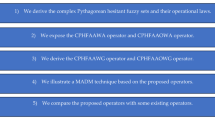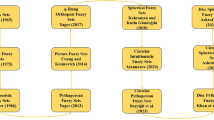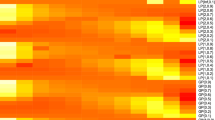Abstract
The aim of this work is to develop a new compatibility for the uncertain multiplicative linguistic preference relations and utilize it to determine the optimal weights of experts in the group decision making (GDM). First, the compatibility degree and compatibility index for the two multiplicative linguistic preference relations are proposed. Then, based on the linguistic continuous ordered weighted geometric averaging (LCOWGA) operator, some concepts of the compatibility degree and compatibility index for the two uncertain multiplicative linguistic preference relations are presented. We prove the property that the synthetic uncertain linguistic preference relation is of acceptable compatibility under the condition that the uncertain multiplicative linguistic preference relations given by experts are all of acceptable compatibility with the ideal uncertain multiplicative linguistic preference relation, which provides a theoretic basis for the application of the uncertain multiplicative linguistic preference relations in GDM. Next, an optimal model is constructed to determine the weights of experts based on the criterion of minimizing the compatibility index in GDM. Moreover, an approach to GDM with uncertain multiplicative linguistic preference relations is developed, and finally, an application of the approach to supplier selection problem with uncertain multiplicative linguistic preference relations is pointed out.
Similar content being viewed by others
References
Alonso S, Cabrerizo FJ, Chiclana F, Herrera F, Herrera-Viedma E (2009) Group decision making with incomplete fuzzy linguistic preference relations. Int J Intell Syst 24:201–222
Bahrammirzaee A, Ghatari AR, Ahmada P, Madani K (2011) Hybrid credit ranking intelligent system using expert system and artificial neural networks. Appl Intell 34:28–46
Bahrammirzaee A, Chohra A, Madani K (2013) An adaptive approach for decision making tactics in automated negotiation. Appl Intell. doi:10.1017/s10489-013-0434-8
Calvo T, Mayor G, Mesiar R (2002) Aggregation operators: new trends and applications. Physica-Verlag, New York
Chen SY, Chen SM (2005) A prioritized information fusion method for handling fuzzy decision-making problems. Appl Intell 22:219–232
Chen HY, Chen C (2009) Research on compatibility and consistency of combination judgment matrices based on I-IOWG operators. Syst Eng Electron 31:2137–2140
Chen HY, Zhao JB (2004) Research on compatibility of fuzzy judgement matrices. Oper Res Manag Sci 13:44–47
Chen HY, Zhou LG (2011) An approach to group decision making with interval fuzzy preference relations based on induced generalized continuous ordered weighted averaging operator. Expert Syst Appl 38:13432–13440
Chen HY, Zhou LG (2012) A relative entropy approach to group decision making with interval reciprocal relations based on COWA operator. Group Decis Negot 21:585–599
Chen HY, Liu JP, Wang H (2008) A class of continuous ordered weighted harmonic (C-OWHA) averaging operators for interval argument and its applications. Syst Eng-Theory Pract 28:86–92
Chen YH, Wang TC, Wu CY (2011) Multi-criteria decision making with fuzzy linguistic preference relations. Appl Math Model 35:1322–1330
Chen HY, Zhou LG, Han B (2011) On compatibility of uncertain additive linguistic preference relations and its application in the group decision making. Knowl-Based Syst 24:816–823
Chen SM, Lee LW, Liu HC, Yang SW (2012) Multiattribute decision making based on interval-valued intuitionistic fuzzy values. Expert Syst Appl 39:10343–10351
Dong YC, Xu YF, Li HY (2008) On consistency measures of linguistic preference relations. Eur J Oper Res 189:430–444
Dong YC, Xu YF, Yu S (2009) Linguistic multiperson decision making based on the use of multiple preference relations. Fuzzy Sets Syst 160:603–623
Gong ZW, Li LS, Zhou FX, Yao TX (2009) Goal programming approaches to obtain the priority vectors from the intuitionistic fuzzy preference relations. Comput Ind Eng 57:1187–1193
Granmo O, Glimsdal S (2013) Accelerated Bayesian learning for decentralized two-armed bandit based decision making with applications to the Goore game. Appl Intell 38:479–488
Herrera F, Herrera-Viedma E, Verdegay JL (1996) Direct approach processes in group decision making using linguistic OWA operators. Fuzzy Sets Syst 79:175–190
Herrera F, Herrera-Viedma E, Chiclana F (2001) Multiperson decision-making based on multiplicative preference relations. Eur J Oper Res 129:372–385
Herrera-Viedma E, Herrera F, Chiclana F, Luque M (2004) Some issues on consistency of fuzzy preference relations. Eur J Oper Res 154:98–109
Li DF (2011) The GOWA operator based approach to multiattribute decision making using intuitionistic fuzzy sets. Math Comput Model 53:1182–1196
Liu PD (2011) A weighted aggregation operators multi-attribute group decision-making method based on interval-valued trapezoidal fuzzy numbers. Expert Syst Appl 38:1053–1060
Merigó JM (2008) New extensions to the OWA operator and its application in business decision making. PhD thesis, Department of Business Administration, University of Barcelona
Merigó JM (2011) A unified model between the weighted average and the induced OWA operator. Expert Syst Appl 38:11560–11572
Merigó JM, Casanovas M (2011) Induced aggregation operators in the Euclidean distance and its application in financial decision making. Expert Syst Appl 38:7603–7608
Merigó JM, Casanovas M (2011) Induced and uncertain heavy OWA operators. Comput Ind Eng 60:106–116
Merigó JM, Gil-Lafuente AM (2011) Fuzzy induced generalized aggregation operators and its application in multi-person decision making. Expert Syst Appl 38:9761–9772
Merigó JM, Gil-Lafuente AM (2011) Decision-making in sport management based on the OWA operator. Expert Syst Appl 38:10408–10413
Merigó JM, Gil-Lafuente AM, Zhou LG, Chen HY (2011) A generalization of the linguistic aggregation operators and its application in decision making. J Syst Eng Electron 22:1–5
Merigó JM, Gil-Lafuente AM, Zhou LG, Chen HY (2012) Induced and linguistic generalized aggregation operators and their application in linguistic group decision making. Group Decis Negot 21:531–549
Saaty TL (1980) The analytic hierarchy process. McGraw-Hill, New York
Saaty TL, Vargas LG (2007) Dispersion of group judgments. Math Comput Model 46:918–925
Sengupta A, Pal TK (2009) Fuzzy preference ordering of interval numbers in decision problems. Springer, Berlin
Tan CQ, Wu DD, Ma BJ (2011) Group decision making with linguistic preference relations with application to supplier selection. Expert Syst Appl 38:14382–14389
Wang TC, Chen YH (2010) Incomplete fuzzy linguistic preference relations under uncertain environments. Inf Fusion 11:201–207
Wang YM, Elhag TMS (2007) A goal programming method for obtaining interval weights from an interval comparison matrix. Eur J Oper Res 177:458–471
Wang YM, Yang JB, Xu DL (2005) A two-stage logarithmic goal programming method for generating weights from interval comparison matrices. Fuzzy Sets Syst 152:475–498
Wang Z, Wang HW, Qi C, Wang J (2013) A resource enhanced HTN planning approach for emergency decision-making. Appl Intell 38:226–238
Wei GW (2010) Some induced geometric aggregation operators with intuitionistic fuzzy information and their application to group decision making. Appl Soft Comput 10:423–431
Wei GW (2010) A method for multiple attribute group decision making based on the ET-WG and ET-OWG operators with 2-tuple linguistic information. Expert Syst Appl 37:7895–7900
Wei GW, Zhao XF (2012) Some induced correlated aggregating operators with intuitionistic fuzzy information and their application to multiple attribute group decision making. Expert Syst Appl 39:2026–2034
Wei GW, Zhao XF (2012) Some dependent aggregation operators with 2-tuple linguistic information and their application to multiple attribute group decision making. Expert Syst Appl 39:5881–5886
Wu J, Cao QW (2011) Some issues on properties of the extended IOWA operators in fuzzy group decision making. Expert Syst Appl 38:7059–7066
Wu J, Cao QW (2013) Same families of geometric aggregation operators with intuitionistic trapezoidal fuzzy numbers. Appl Math Model 37:318–327
Wu J, Li JC, Li H, Duan WQ (2009) The induced continuous ordered weighted geometric operators and their application in group decision making. Comput Ind Eng 58:1545–1552
Wu J, Cao QW, Zhang JL (2010) Some properties of the induced continuous ordered weighted geometric operators in group decision making. Comput Ind Eng 59:100–106
Wu J, Cao QW, Zhang JL (2011) An ILOWG operator based group decision making method and its application to evaluate the supplier criteria. Math Comput Model 54:19–34
Xia MM, Xu ZS, Zhu B (2012) Some issues on intuitionistic fuzzy aggregation operators based on Archimedean t-conorm and t-norm. Knowl-Based Syst 31:78–88
Xu ZS (2000) On consistency of the weighted geometric mean complex judgement matrix in AHP. Eur J Oper Res 170:683–687
Xu ZS (2004) On compatibility of interval fuzzy preference relations. Fuzzy Optim Decis Mak 3:217–225
Xu ZS (2004) EOWA and EOWG operators for aggregating linguistic labels based on linguistic preference relations. Int J Uncertain Fuzziness Knowl-Based Syst 12:91–810
Xu ZS (2004) Uncertain multiple attribute decision making: methods and applications. Tsinghua University Press, Beijing
Xu ZS (2004) A method based on linguistic aggregation operators for group decision making with linguistic preference relations. Inf Sci 166:19–30
Xu ZS (2004) Uncertain linguistic aggregation operators based approach to multiple attribute group decision making under uncertain linguistic environment. Inf Sci 168:171–184
Xu ZS (2005) Deviation measures of linguistic preference relations in group decision making. Omega 33:249–254
Xu ZS (2006) An approach based on the uncertain LOWG and the induced uncertain LOWG operators to group decision making with uncertain multiplicative linguistic preference relations. Decis Support Syst 41:488–499
Xu ZS (2006) A C-OWA operator based approach to decision making with interval fuzzy preference relation. Int J Intell Syst 21:1289–1298
Xu ZS (2006) Induced uncertain linguistic OWA operators applied to group decision making. Inf Fusion 7:231–238
Xu ZS (2006) A practical procedure for group decision making under incomplete multiplicative linguistic preference relations. Group Decis Negot 15:593–604
Xu ZS (2007) A survey of preference relations. Int J Gen Syst 36:179–203
Xu ZS (2007) Intuitionistic preference relations and their application in group decision making. Inf Sci 177:2363–2379
Xu ZS (2008) Intuitionistic fuzzy information: aggregation theory and applications. Science Press, Beijing
Xu ZS (2010) A method based on distance measure for interval-valued intuitionistic fuzzy group decision making. Inf Sci 180:181–190
Xu ZS (2011) Consistency of interval fuzzy preference relations in group decision making. Appl Soft Comput 11:3898–3909
Xu ZS, Chen J (2008) An overview of distance and similarity measures of intuitionistic fuzzy sets. Int J Uncertain Fuzziness Knowl-Based Syst 16:529–555
Xu YJ, Wang HM (2012) The induced generalized aggregation operators for intuitionistic fuzzy sets and their application in group decision making. Appl Soft Comput 12:1168–1179
Xu ZS, Xia MM (2011) Induced generalized intuitionistic fuzzy operators. Knowl-Based Syst 24:197–209
Yager RR (1988) On ordered weighted averaging aggregation operators in multi-criteria decision making. IEEE Trans Syst Man Cybern, Part B, Cybern 18:183–190
Yager RR (2003) Induced aggregation operators. Fuzzy Sets Syst 137:59–69
Yager RR (2004) OWA aggregation over a continuous interval argument with applications to decision making. IEEE Trans Syst Man Cybern, Part B, Cybern 34:1952–1963
Yager RR (2004) Generalized OWA aggregation operators. Fuzzy Optim Decis Mak 3:93–107
Yager RR, Filev DP (1999) Induced ordered weighted averaging operators. IEEE Trans Syst Man Cybern, Part B, Cybern 29:141–150
Yager RR, Kacprzyk J (1997) The ordered weighted averaging operators: theory and applications. Kluwer Academic, Norwell
Yager RR, Xu ZS (2006) The continuous ordered weighted geometric operator and its application to decision making. Fuzzy Sets Syst 157:1393–1402
Yager RR, Kacprzyk J, Beliakov G (2011) Recent developments in the ordered weighted averaging operators: theory and practice. Springer, Berlin
Yang W, Chen ZP (2012) The quasi-arithmetic intuitionistic fuzzy OWA operators. Knowl-Based Syst 27:219–233
Yu XH, Xu ZS (2013) Prioritized intuitionistic fuzzy aggregation operators. Inf Fusion 14:108–116
Yu DJ, Wu YY, Lu T (2012) Interval-valued intuitionistic fuzzy prioritized operators and their application in group decision making. Knowl-Based Syst 30:57–66
Yue ZL (2011) Deriving decision maker’s weights based on distance measure for interval-valued intuitionistic fuzzy group decision making. Expert Syst Appl 38:11665–11670
Zeng SZ, Su WH (2011) Intuitionistic fuzzy ordered weighted distance operator. Knowl-Based Syst 24:1224–1232
Zhang HM, Xu ZS (2005) Uncertain linguistic information based COWA and COWG operators and their applications. J PLA Univ Sci Technol 6:604–608
Zhang QS, Jiang SY, Jia BG, Luo SH (2011) Some information measures for interval-valued intuitionistic fuzzy sets. Inf Sci 180:5130–5145
Zhao H, Xu ZS, Ni MF, Liu SS (2010) Generalized aggregation operators for intuitionistic fuzzy sets. Int J Intell Syst 25:1–30
Zhou LG, Chen HY (2010) Generalized ordered weighted logarithm aggregation operators and their applications to group decision making. Int J Intell Syst 25:683–707
Zhou LG, Chen HY (2011) Continuous generalized OWA operator and its application to decision making. Fuzzy Sets Syst 168:18–34
Zhou LG, Chen HY (2012) A generalization of the power aggregation operators for linguistic environment and its application in group decision making. Knowl-Based Syst 26:216–224
Zhou LG, Chen HY, Liu JP (2012) Generalized power aggregation operators and their applications in group decision making. Comput Ind Eng 62:989–999
Zhou LG, Chen HY, Merigó JM, Gil-Lafuente AM (2012) Uncertain generalized aggregation operators. Expert Syst Appl 39:1105–1117
Zhou LG, Chen HY, Liu JP (2013) Generalized multiple averaging operators and their applications to group decision making. Group Decis Negot 22:331–358
Acknowledgements
The work was supported by National Natural Science Foundation of China (No. 71071002), Higher School Specialized Research Fund for the Doctoral Program (No. 20123401110001), The Scientific Research Foundation of the Returned Overseas Chinese Scholars, Anhui Provincial Natural Science Foundation (No. 1308085QG127), Provincial Natural Science Research Project of Anhui Colleges (No. KJ2012A026), Humanity and Social Science Youth foundation of Ministry of Education (No. 13YJC630092), Humanities and social science Research Project of Department of Education of Anhui Province (No. SK2013B041). The authors are very grateful to the anonymous reviewers and the editor for their insightful and constructive comments and suggestions that have led to an improved version of this paper.
Author information
Authors and Affiliations
Corresponding author
Rights and permissions
About this article
Cite this article
Zhou, L., He, Y., Chen, H. et al. On compatibility of uncertain multiplicative linguistic preference relations based on the linguistic COWGA. Appl Intell 40, 229–243 (2014). https://doi.org/10.1007/s10489-013-0454-4
Published:
Issue Date:
DOI: https://doi.org/10.1007/s10489-013-0454-4




